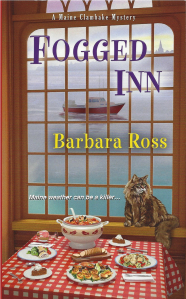How Do Writers Really Feel about Reader Reviews?
by Barb, back in Massachusetts, consumed by a book deadline and an upcoming wedding
 The fourth book in my Maine Clambake Mystery series came out recently, so it’s given me plenty of opportunity to think about reader reviews.
The fourth book in my Maine Clambake Mystery series came out recently, so it’s given me plenty of opportunity to think about reader reviews.
Of course, there is no one way writers feel about reviews. All the Wickeds keep track of traditional media and blog reviews (and are grateful for them), but when it comes to reader reviews, we are all over the map. One of us never looks at Goodreads or Amazon, one of us checks obsessively, constantly looking for new reviews, and the rest fall on a spectrum in between.
To check for new reviews on Amazon, if the number of reviews shown for any book listed on your author page ticks upward, click on the number, then click on See all xx customer reviews, then scroll down and flip the Sort by choice to Most recent.
Yes, you are right, I have just outed myself as the one who “checks obsessively.”
 I think the main reason I check so frequently is because my business background taught me to hunger for constant and frequently updated data, and that is something us lay people just don’t get in the publishing biz. Apple can probably tell you within half an hour every iPhone that’s been sold, what the configuration and price was, and who sold it to whom. Publishers claim they can only reconcile book sales after six months, and can only inform authors about it six months after that. I admit it. It makes me crazy.
I think the main reason I check so frequently is because my business background taught me to hunger for constant and frequently updated data, and that is something us lay people just don’t get in the publishing biz. Apple can probably tell you within half an hour every iPhone that’s been sold, what the configuration and price was, and who sold it to whom. Publishers claim they can only reconcile book sales after six months, and can only inform authors about it six months after that. I admit it. It makes me crazy.
So I look for data anywhere I can find it, and reviews, especially number and frequency of reviews being added on Amazon and Goodreads, seem as good a proxy as any.
 This means I read them all. The good ones are gratifying, of course. The less good ones are interesting, too. In every book I try something different, not to be perverse, and not because I am at all bored with the traditional/cozy form, but to avoid repetition and because I believe the tale I’m telling demands it.
This means I read them all. The good ones are gratifying, of course. The less good ones are interesting, too. In every book I try something different, not to be perverse, and not because I am at all bored with the traditional/cozy form, but to avoid repetition and because I believe the tale I’m telling demands it.
For example with Fogged Inn, the book starts with the discovery of the body. The book moves forward in time from there, but Julia goes back to the night before the murder in conversations with people and in her personal reflections throughout the book. So not true flashbacks, but kind of. There are a lot of suspects, because each suspect is really a couple, that multiples the suspect pool by two. Finally, without spoilers, the resolution of the mystery is not a traditional one for an amateur sleuth.
Some readers react well to one or more these elements and say so in their reviews, and some don’t like one or more. Some people hate one or more. I am fascinated with the reactions.
The reviews that are the hardest to read are the ones that point out a spot in a book I know is weak. “Oh, man, ya caught me,” or “Darn, I didn’t paper that over as well as I thought,” is usually my reaction.
And some reviews are just really terrible. People hate the writing style or the protagonist or the story. Just hate it.
People who have never put anything out to the public to be judged often wonder how writers, or people working in any part of the arts or entertainment fields, deal with those “just hate it,” reviews.
Luckily, the “hate it” reviews are usually mixed in with several “loved it” reviews. Sometimes, the book is the wrong genre or in some other way a bad fit for the reader. As Sherry’s daughter says, “You can have the sweetest peach, but if the person you offer it to doesn’t like peaches…”
 Editing the Level Best Books series taught me how huge a role personal taste plays in people’s reactions to fiction. Us four editors, aside from being of two different genders, were probably demographically indistinguishable from one another from a pollster’s perspective. Yet, there were stories some of us loved and others hated. There were stories people argued passionately for that other people didn’t care about at all. And when we sent our little book out into the world, we were always surprised by which stories were recognized by awards or nominations and which were specifically mentioned in reviews. Honestly, most of the time I guessed wrong about what our standouts would be.
Editing the Level Best Books series taught me how huge a role personal taste plays in people’s reactions to fiction. Us four editors, aside from being of two different genders, were probably demographically indistinguishable from one another from a pollster’s perspective. Yet, there were stories some of us loved and others hated. There were stories people argued passionately for that other people didn’t care about at all. And when we sent our little book out into the world, we were always surprised by which stories were recognized by awards or nominations and which were specifically mentioned in reviews. Honestly, most of the time I guessed wrong about what our standouts would be.
With novels, it’s really all about the math. The number of reviews is probably a decent proxy for how well a book has sold, and the averages may tell you something about the quality, but the individual bad reviews don’t mean that much. In fact, the more popular a book is, the more likely people outside it’s core audience are to try it. So a book selling tons will usually have a lower Goodreads or Amazon average rating than a book selling only to its niche readers and no farther.
I know as a consumer of movies, when I look at Rotten Tomatoes, I look at average ratings for critics and for fans (and ponder it a bit if one is wildly different from the other in either direction) and base my decision to watch on those averages, not on the individual reviews.
One thing typical reader reviewers (as opposed to book bloggers and others who also leave reviews on Amazon, etc.) may not know is that when you follow reviews as closely as I do, you get to know who some frequent reviewers are, and you’re watching them just as they’re watching you. One man who has left glowing reviews for all the Maine Clambake Mysteries and even went to the Cabbage Island Clambake was disappointed with Fogged Inn. I feel badly about that and hope he stays around for the next book. Another reviewer has trashed every one of my books on Goodreads and vows every time not to read another one. I always think, “Good, don’t,” (despite everything I just said about averages and number of reviews). And yet she returns again and again.
I described these reviewers to a non-writer friend, and he found it creepy and stalkerish, both their interest in me and my knowledge of and interest in them. But I find it fun, and a part of my world. And I’m grateful to all them. Really.
Filed under: Barb's posts Tagged: amazon, Cabbage Island Clambake, Fogged inn, goodreads, maine clambake mysteries, rotten tomatoes




